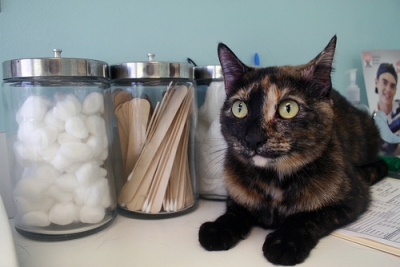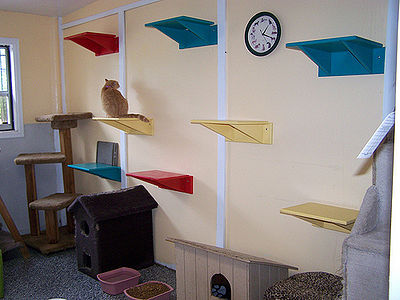FLUTD (Feline Lower Urinary Tract Disease) is a common ailment in cats and can recur. It affects the bladder and the urethra. Some of these conditions include :
Cystitis – an inflammation of the bladder which can cause blood, mucous and tissue cells to accumulate in the bladder.
Bacterial Infection – Caused by the blood, mucous and tissue cells in the bladder as a result of cystitis.
Urethral Blockage – Caused by crystals forming, irritating the bladder and urethra lining. The clay-like material that forms results in a blockage which is life-threatening. Male cats are more prone to urethral blockages.
Uremia – an accumulation of toxic substances in the bloodstream due to an untreated blockage.
Most common causes of FLUTD can be trauma, urinary tract infections, cancer, stones, abnormal anatomy, cystitis. Contributing factors may be a diet of only dry food, obesity, litter type/litter box, lack of exercise, stress.
Symptoms of FLUTD can include urinating outside litter box, frequent attempts to urinate, straining and/or crying when urinating, blood in the urine, excessive licking of genitals.
The inability to pass urine is an emergency situation and your cat should be seen by a vet ASAP. A blocked urethra can lead to uremia, a ruptured bladder, organ failure and death in as little as one or two days.
Your vet should begin treatment with a bacterial culture to determine type of treatment necessary. It’s very important to ensure the correct antibiotic is administered if required and to discover the cause of the problem.
You can help in the prevention of FLUTD by eliminating most dry food from the diet and switching to canned food or raw. Chicken and seafood can contain allergens so keep them away for at least 3 months. Increase kitty’s water intake. Cats enjoy drinking from running water so consider purchasing a pet fountain.
A study of cats with FLUTD found that stress can be a contributing factor to the disease including changes in environment, over-vaccination, poor nutrition, a litter box not cleaned often enough or in a high traffic area. Spending increased time with your cat, playing, grooming, petting or just chilling out can help reduce stress.
Using homeopathic remedies can also de-stress your cat. But please make sure that what you use is for cats only to avoid poisoning..



